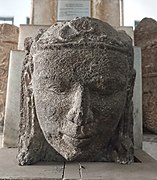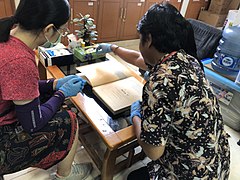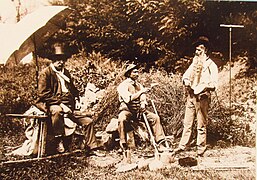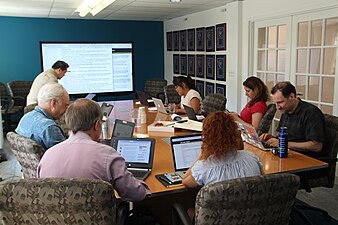GLAM/Newsletter/July 2019/Single
Members of the National Assembly of Armenia
Members of the National Assembly of Armenia
In the frame of the GLAM project, this month Wikimedia Armenia decided to take the photos of the new elected Members of the Armenian National Assembly. For that reason, Wikimedians Gayane Vardanyan, Mher Bekaryan, and Armen Mirzoyan visited the National Assembly of Armenia. During the visit, there had been taken not only the photos of Parliament Members but also the holes and rooms of the Armenian Parliament.
During 2 days there had been taken the photos of 68 Parliament Members (from 132) and then the photos were uploaded to Commons. It is planned to continue the process in September when the Parliamentarians will return from the vacation.
Staying warm over winter
Winter Wiki Edit-A-Thon
On Saturday, 20th July 2019, following the success of our first event, a second edit-a-thon was run at the Richmond Library in Melbourne, in partnership with the Women's Art Register for a Winter Wiki Edit-A-Thon, in close proximity to their archives making the creation of articles possible. We were again joined by the WikiD team in a very successful event.
Steve Crossin joined Pru Mitchell and Alex Lum to facilitate the training, and using the dashboard, our 13 participants added 74,000 words and six new files about creative women to Wikipedia and Wikimedia sites.

7 new articles were created in the event:
- Oi Choong, architect
- Carlene West, indigenous artist
- Emily Floyd, public artist and sculptist
- Merris Hillard, printmaker and photographist
- Gennie Batterham, filmmaker
- Artist, founder of Women's Art Register
- Caroline Phillips, visual artist
We look forward to partnering with the Women's Art Register on future events to help encourage more women to contribute to Wikipedia, and improve the coverage of under-represented subjects on Wikimedia sites.
Winter out west
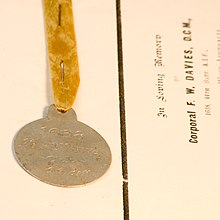
Yes it is winter, and while across the country we moved indoor for a bit warmth and creation of more content. WikiClubWest continued with efforts digitizing content from the City of Canning Heritage Collection. Within the collection we worked with material relating to the Queens Park Volunteer Fire Brigade (later to become the Canning Volunteer fire Bridge). We also digitized documents about Frederick William Davies, a member of the 1st AIF and recipient of the Distinguished Service Medal.
Looking ahead
Wikimedia Australia was asked during World of Wikipedia Conference if we could assist Ingrid Cumming in presenting on Noongarpedia project and on the challenges faced with the inclusion of Australian Indigenous knowledge at Wikimania. If you're attending Wikimania you can join her yarn in the Menchú room at 14:00 on Sunday 18th August.
The Wikimedia Australia committee has brought forward its Annual General meeting to the 25 August, where the committee to lead WMAu into the next 12 months will elected.
Heidelberg symposium
Andy Mabbett visited Germany again, this time to give a Wikidata workshop and a keynote address, "Science in Wikipedia and its sister projects - how you can play your part", at the Molecular Biosciences Symposium on Science Communication at the University of Heidelberg.
Cultural Gardener Summer Project in Indonesia
Wikimedia Taiwan–Wikimedia Indonesia collaboration
In the early 2019, Wikimedia Indonesia was contacted by Shangkuanlc (from Wikimedia Taiwan). He said that there would be a pilot project to documenting objects in the National Museum of Indonesia and enriching the contents in the Wikimedia projects related to the museum. This will be participated by students from National Chengchi University and National Cheng Kong University. The project was intended to be a summer project, when the students are free from their university activities and are able to stay overseas for at least one month. After further discussion, the project would happen in July 2019 and three students would be flying to Indonesia.
The National Museum of Indonesia was chosen because of its uniqueness of placing the objects in the courtyard. The students, guided by their professor in the university, were trying to find out the reason behind the object placement, and create a short documentation video to explain their findings to the public. In addition, the students also took photograph of the statues inside the museum, uploaded the photographs to Wikimedia Commons, and also created Wikidata items for each objects.
Outcomes
After visiting the museum and interviewing several sources, including the museum staff, they were able to produce a video, explaining the background of the museum, how they engage with the visitors, and how GLAM project have impact in the museum and/or other institutions in Indonesia. A 5-minute video can be watched here.
The team also successfully uploaded 196 photographs of museum objects to Wikimedia Commons, and created 182 new Wikidata items, completed with the corresponding statements and object inventory numbers from the National Museum of Indonesia.
Gallery
Future activities
This August, Wikimedia Indonesia will start its digitization activities in Museum Uang Sumatera and Pusat Penelitian Kelapa Sawit. These institutions have signed agreements and agreed to open their collections to Wikimedia Commons.
Collaboration with the PhotoIreland Foundation
PhotoIreland Festival

As part of the PhotoIreland Foundation's 2019 PhotoIreland Festival, Wikimedia Community Ireland were invited to host an editing event at the Museum of Contemporary Photography of Ireland at Dublin Castle. A group of new editors were guided through an introduction to Wikipedia and Wikimedia Commons. The event also saw a lively discussion on how contemporary photographers and artists can contribute their work to platforms such as Commons, in particular the value of uploading self portraits or portraits of fellow photographers. With this, there was an explanation of the nuances of conflict of interest, and how those who may have articles on Wikipedia can and cannot interact with that content. This event was part of PhotoIreland's overall goal to document and promote contemporary and historic photographers in or from Ireland, and is planned to be the first of a series of partnered events.
Archeology in alpine valleys
A small but notable museum, now on Wikipedia...

Ornavasso is a small town in a valley connecting the Lago Maggiore via the Simplon Pass to Switzerland, it's the most southern Walser settlement but they are not the first who settled there...
In August 1890 Enrico Bianchetti, a local historian of Ornavasso, was very surprised when, during some excavation works on the railway line, some graves were found. It turned out to be the biggest Lepontic necropolis ever found.
In July 2019 members of InFormAzioni association and of Insubria local group were very surprised when they discovered that the planned visit at the archeological museum in Ornavasso would be guided by a very nice lady. It turned out to be a famous archeologist and specialist of Celtic history and culture, Paola Piana Agostinetti who is also curator of the museum.
The small museum hosts some notable treasures found in the 345 graves, due to the italian laws we were afraid to take pictures (even if we had the authorization) so we have to go there again and take more. In the afternoon we literally invaded the local library to write about the monuments of the small town (Here's the dashboard).
The event was part of the project Sui passi di Carlo Amoretti which aim is to retrace the tour described by this ancient writer and scientist in a new modern "wiki-way" organizing content creation events. Project and events are organized by InFormAzioni association with the support of Wikimedia CH.
Wikimedia projects for GLAMs summer school
Wikimedia Italia is planning the first edition of the summer school "Wikimedia projects for GLAMs" that will be hold from 9th to 13th of September in BASE Milan. The program includes workshops and case studies on Wikipedia, Wikidata, Wikisource and Commons and it involves collaboration with several Italian cultural institutions such as Museo nazionale della scienza e della tecnologia Leonardo da Vinci, BEIC, AIB and International Council of Museums.
Wikipedia in Academia
Corrado Petrucco, a Wikimedia Italia member, is planning the international meeting "Wikipedia in Academia" that will take place on 20th and 21th of September in Padua. University teachers from all over the world will present their experience with "Wikipedia method" in their academic courses. During Friday several relators, such as Neil Thompson, Computer Science and Artificial Intelligence Lab professor at MIT, Melissa Highton Digital Learning, Teaching & Web coordinator at Edimburgh Univeristy, Eduard Aibar from Universitat Oberta de Catalunya and Brian Mckenzie from Maynooth University IE., will speak about using Wikipedia both in humanities and in scientific subject. During Saturday wikimedians will hold two workshops for high school teachers and some case studies.
PoliMi
A third Wikipedia course for PhD candidates was run at the Politecnico di Milano ("Polytechnic University of Milan"). One again, Andy Mabbett visited to lecture on Wikipedia, Wikidata and Wikimedia Commons, and to teach Wikipedia editing. He was joined by Italian editors Marco Chemello and Niccolò "Jaqen" Caranti. As the course dashboard shows, 90 new articles - mostly on STEM subjects - were created and further 238 edited. During Andy's visit, he also met with the BEIC digital library team, and enjoyed a social event with local Wikimedians. It is already planned to run the course again in 2020.
Sámi place names – collaboration with the Sámi Várdobáiki Language Center
Sámi place names

Wikimedia Norge and the Sámi Várdobáiki Language Center are starting a project about Sámi place names and cultural heritage monuments along a new road, Hålogalandsvegen, that is being build in the northern part of Norway. The project is funded by The Fritt Ord Foundation. During the music festival Márkomeannu an event on Sámi place names took place. A project page is being set up here. In October, during the week long official Sámi Parliament celebration of The Year of Indigenous Languages, a staff member from Wikimedia Norge will join a place name workshop at Várdobáiki Language Center.
In August 2019 Women in Red is once again focusing on indigenous women from around the world. Many articles about Sámi women have been written, and one of them is actually about a current staff member at Várdobáiki Language Center, Ann-Mari Thomassen. She has been vital in establishing one of the articles written. A big thanks to all the contributors to the Women in Red project.
More bibliographic data on Wikidata; National Library of Sweden; GLAM activities Wikimania
More bibliographic data on Wikidata – about old books
As part of its work with bibliographic data, Wikimedia Sverige has uploaded 5,000 Wikidata items connected to books in the Project Runeberg catalog. Project Runeberg is a digital library containing out-of-copyright Nordic, mostly Swedish literature. It's probably better known than Wikisource, and very popular among Swedish Wikipedia editors who use the books as source material in their articles. Our goal with this addition was to bring more bibliographic data to Wikidata that is relevant to Wikipedians.
If you think Project Runeberg is cool, why not have a look at the Mix 'n' Match for Runeberg authors?
Collaboration with the National Library of Sweden continues
We are going to continue our collaboration with the National Library of Sweden, focused on bibliographic data on Wikidata, for another year. As we are wrapping up the first stage of the project, we have published a summary, containing some reflections and plans for the future – some concrete ones and some that are more ambitious.
In the very nearest future, we are going to talk about our project at Wikimania, as well as meet representatives from several libraries to discuss how they can best leverage Wikidata and Wikibase in their work.
Many GLAM activities planned for Wikimania
During the summer a lot of planning has gone in to the GLAM related activities around Wikimania. The Culture crawls are fully booked, but there's still room on some of the museum and city tours and at the edit-a-thons during the week. Enjoy as much of the Stockholm GLAM world as you can during Wikimania.
Oxford and Coventry Updates
Oxford
A data set about 97 astrolabes in the Adler Planetarium in Chicago was added to Wikidata this month and one image of each astrolabe was shared on Commons. The Astrolabe Explorer application is better as a result: in the entries for Khalil Muhammad ibn Hasan Ali and Muhammad ibn Ahmad al-Battuti you can see works they have created from multiple collections.
Martin gave a one-hour guest lecture at the Digital Humanities in Oxford Summer School on "Knowledge Representation the Easy Way" (slides on Google Drive). An audience of eighty people — mainly postgraduates and early career researchers in humanities — saw how Wikidata can provide data sets, visualisations and code samples about people, places or artworks of interest. A lot of the session was taken up with a demonstration of Mix'n'Match, showing how anyone, by matching identifiers like the Digital Atlas of the Roman Empire or the Pleiades index of the ancient world, can help humanities research.
At a separate event, Martin gave a lecture on "Wikidata for GLAMs" to library and museum staff in Oxford (slides on Google Drive). Seventeen attendees saw how Wikidata can be used to connect museum collections with other sources of information such as the Benezit Dictionary of artists, and how sharing collections data on Wikidata makes it available to lots of different applications. Martin has also been working on a final evaluation report for his Oxford placement (which is due to end on 31 October).
Coventry
Andy's residency at Coventry University began to have an impact, with out-of-copyright material, including artworks and scientific publications, sourced and uploaded to Wikimedia Commons and Wikisource. The speaking voices of two academics were recorded and added to their Wikipedia biographies as part of the "Voice Intro Project" (#WikiVIP). Less publicly visible were the many team meetings addressed by Andy, as he establishes partnerships in the university's four faculties and other departments, for project work later in the residency. Andy also took time out to teach a Wikipedia course at the Polytechnic University of Milan and to speak at a symposium at the University of Heidelberg - see Italy report and Germany report for details.
#1Lib1Ref Uganda 2019
1Lib1Ref Uganda 2019
For the first time, Uganda was able to be a part of and contribute to this campaign as part of our baby steps in relation to GLAM activity and participation. This was done in collaboration with a small number of specifically invited participants who are all practicing librarians and we were hosted by our local partner, Goethe-Zentrum Kampala on 1st June 2019. The decision to make this an invite-only event was influenced by the fact that this was our first foray into this campaign so it would be relatively easier to involve individuals who by virtue of their work, have an existing knowledge of bibliographic work.
As the Wikimedia Community User Group Uganda, participation in GLAM has long been one of our aims so this was a good opportunity to make an inroad into that area. In order to marry it with existing projects, we used a pre-selected list of articles that had been created during the time we undertook the Wiki Loves Women project. This had multiple positive effects ,namely but not limited to improving the quality of articles written about notable women in Uganda through proper and accepted citation; employing the bibliographic skills of the participants for a Wikipedia cause as well as building a network of information professionals.
Our participation in this campaign is largely in part due to Felix Nartey who tirelessly encouraged us to participate as well as Isla Haddow-Flood who suggested that we marry 2 campaigns - Wiki Loves Women and #1Lib1Ref.
You can see more of our activity here:
Summer meetups and Picnics
Smithsonian AWHI All Work No Pay
Smithsonian National Museum of American History and Wikimedia DC held a meetup, Smithsonian AWHI All Work No Pay
Center for Public Integrity FOIA
Center for Public Integrity and Wikimedia DC held a meetup, Center for Public Integrity FOIA. which they covered, Center for Public Integrity boosts public knowledge with Wikipedia editathon
Colorado/Wiknic/2019
Colorado Wikimedia held a picnic, Colorado/Wiknic/2019.
San Diego
San Diego Wikimedian User Group held a meetup, San Diego/July 2019
-
June bonfire
Asian American Literature Festival Wikipedia Edit-a-thon
Wikimedia DC and the 2019 Asian American Literature Festival held a meetup, Asian American Literature Festival Edit-a-thon. Attendees included poets Ching-In Chen, Dr. Cynthia Arrieu-King, and writer Kyle Lucia Wu.
Visualising the status and the spread of a cultural collection in Wikipedia

Map the GLAM is part of a PhD thesis focusing on cultural content aggregators, such as Wikimedia Commons. The thesis aims to discover interface characteristics that may foster the access and usage of digital images released under open licenses by GLAMs. The project has two main goals. On the one hand, it tries to define a set of visual representations to analyse the status and the spread of a digitised collection in Wikipedia and its sister projects. On the other hand, it tries to identify usability issues that hinder the access and usage use of digital images.
Map the GLAM is a project by Giovanni Profeta. It is developed within DensityDesign research lab in the framework of the PhD in Design at Politecnico di Milano, with the support of the Laboratory of visual culture SUPSI.
Visual analysis
In a preliminary phase, a map of GLAMs contributing to Wikimedia Commons was made to select a specific cultural institution to be analysed. Among them, ETH Library was selected because it is one of the leading cultural institutions in terms of files uploaded in Wikimedia Commons. Then a set of visualisations was made after gathering data from the Wikimedia Commons and Wikipedia API. The visualisations show the following metrics: the frequency of the contribution, the images' size, the images' spread over Wikimedia projects, the daily page views of pages containing ETH Library images and the position of ETH Library images within Wikipedia pages.
-
Map of the libraries contributing to Wikimedia Commons.
-
Timeline of ETH Library images in Wikimedia Commons.
-
Chart of the physical and digital size of ETH Library images.
-
Chart of the daily page views of Wikipedia and Commons pages containing collection images.
-
Chart of the average position of ETH Library images within Wikipedia pages.
The data visualisations have made visible the vast extension of the ETH collection regarding time, authors and mediums. Over the period 2016—2018, 8.800 users contributed to add around 1.000 images in more than 1.000 Wikipedia pages. The most used images portray intellectuals and other famous people but also aerial views of cities. The pages that mainly feature ETH images are pages about European and African cities.
Design project
GLAM Culture Hub is an interactive mockup of a digital archive collecting digitised items coming from multiple GLAMs. It was designed after the visual analysis of ETH Library's images over Wikimedia projects. The goal of GLAM Culture Hub is to evaluate, through an online survey, interface characteristics that may foster the access and usage of digital images within cultural content aggregators.
The evaluation phase is still in progress. If you would like to contribute to the research, after watching the video demo or navigating the interactive prototype, you can fill in the survey. The survey will take 10 minutes to complete.
N.B.: the interactive prototype consists of static images with the addition of some sensible areas; thus, functions cannot be performed.
> Survey on the GLAM Culture Hub interface
-
GLAM Culture Hub - video.
-
GLAM Culture Hub - homepage.
-
GLAM Culture Hub - GLAM page.
-
GLAM Culture Hub - single item.
Other statements; Wikimania; blog posts on SDC
New feature release: other statements
It is now possible to add other statements than just Depicts statements to files on Wikimedia Commons. How does this work? See below for a few examples of Wikimedia Commons files described with structured data.
A simple case

This photo of sugar cubes has captions in many different languages:

It has a Depicts statement (it depicts sugar cubes) with a few qualifiers (twelve sugar cubes in the color white). You can see this statement (and others) by clicking on the Structured data tab in the file page.

In addition, the file also has various other statements, indicating the license, creator and quality assessment.
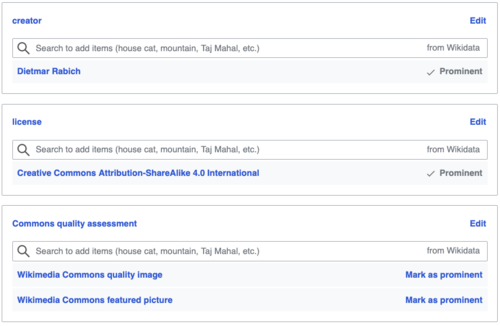
A file showing a two-dimensional artwork

This file is a faithful digital representation of a two-dimensional artwork: Jan Bruegel the Elder's The Last Judgement (1602), collection Statens Museum for Kunst.
To indicate that, it has the following structured data statement, pointing to the Wikidata item for that specific artwork:

How can you help?
The two above examples are among the very first Wikimedia Commons files with structured data. Their structured data is still very incomplete. Just like in the early days of Wikidata, the data model for such files (which fields and properties are needed) is not fully established yet. Especially for GLAM files, a lot of thinking is welcome to build best practices on how to describe them properly with structured data. You can help in the following ways:
- Experiment and add structured data to existing uploaded files, and think what kind of data (Wikidata properties and items) you need for that
- Contribute to data modelling discussions. You can check the properties table on Wikimedia Commons to see if the community has already been discussing the kind of data you are interested in. And you can engage on its talk page if you want to discuss and ask questions.
- Propose properties for Wikimedia Commons. The dedicated page for this is at d:Wikidata:Property proposal/Commons; you can see existing Wikidata properties for Wikimedia Commons at this query (click the blue arrow button to run the query): https://w.wiki/6tS.
Structured Data on Commons and GLAM at Wikimania
The following Wikimania sessions will focus on Structured Data on Wikimedia Commons:
- Wikimania 2019 Hackathon - GLAM focus area
- Structured Data on Wikimedia Commons for GLAM-Wiki
- Structured Data on Commons hands-on training
- Describing files on Structured Commons: problems and opportunities
Blog posts about Structured Data on Commons
Two blog posts by Keegan explain the first steps in the development process of Structured Data on Commons. More blog posts in this series will follow.
- Structured Data on Commons – A Blog Series
- Structured Data on Commons, Part Two – Federated Wikibase and Multi-Content Revisions
Books & Bytes–Issue 34, May–June 2019
In this issue we highlight some expanded partnerships, #1Lib1Ref, global developments and, as always, a roundup of news and community items related to libraries and digital knowledge.
Partnerships
- We are happy to announce that access to Annual Reviews now includes all of this publisher's collections, an expansion from the previous Biomedical Life access.
- More accounts have also been made available from Project MUSE, which had been waitlisted for some time.
To apply for access to these or other partner resources through The Wikipedia Library, visit the Library Card Platform.
#1Lib1Ref
The latest iteration of #1Lib1Ref wrapped up on 5 June. This campaign saw engagement across multiple countries and languages, as evidenced by the Outreach Dashboard. Over 2000 edits across 23 projects were recorded using the hashtag #1lib1ref, and over 400 used the alternate hashtag #1bib1ref. The next iteration will be 15 January to 5 February 2020.
A student is working on a Google Summer of Code project to improve features of the Hashtags tool to support this and similar campaigns. A graphs page has now been added, displaying some new charts and tables about search results. You can test out the feature by clicking the Show Statistics button, and join the conversation on Phabricator.
Wikimedia and Libraries User Group
The user group's steering committee voted on candidates for the affiliate-selected Board seats (ASBS). The process was previously limited to affiliates and thematic organisations but was this year opened to user groups as well. The Wikimedia and Libraries User Group was invited to vote on the nominated candidates. The steering committee discussed and ranked the candidates individually, and a tally of the rankings was posted on the talk page of the user group. On behalf of the user group, and as a contact for the group, Merrilee cast the vote. The ASBS results can be found here. After a short lapse in updating meeting minutes on Meta, the steering committee has once again picked up on posting minutes on the meeting minutes subpage. There's a Libraries Space in Wikimania 2019 for all things library. To register your interest and (or) suggest proposals, visit the Wikimania Wiki.
Global
The campaign saw an increase in participation from emerging communities with a couple first-time participants or communities making some strides. A coordinator from the Farsi Wikipedia (User:Darafsh) for the first time led the #1lib1ref campaign in Iran. The campaign led to a massive contribution from the Farsi community which saw the language at second place in terms of contributions. Their overall contributions to the campaign were about 22% of the total number of edits contributed.
Bytes in brief
- (English) Teaching intelligence: putting Wikipedia at the heart of a class
- (Swedish) Var med och bidrag till världens största databas av kulturarvsinstitutioner!
- (English) Integrating Wikidata at the Library of Congress
- (English) Wikimedia and the culture sector: a new impact study
- (English) How to outsmart algorithms and take control of your information diet
- (English) Knowledge isn't neutral: on radical librarianship
I ain't no square with my corkscrew hair
News
- The Wikibase community Telegram group has been recreated, here's the invitation link
- The Wikidata Menu Challenge - Wikimania 2019 edition started July 16 and goes on until August 11.
- Property number 7000: DigitalNZ ID is live. This data aggregator has over 30 million records. The proposal was the first from Ambrosia10, a New Zealand editor. You can propose new properties, too!
- Wikimania's draft program has been published
Your reading list
- Placing EveryPolitician on hold by MySociety ("it's clear that Wikidata should be the natural global home for this type of data")
- Celebrity Profiling by Matti Wiegmann et al.,
- Wikidata as opportunity for special collections: the 20th Century Press Archives use case. Presentation at LIBER 2019 (LOD working group of the Association of European Research Libraries), by Joachim Neubert
- A new Wikidata map and comparison with previous maps, by Addshore
- The story of building the inteGraality tool at the Wikimedia Hackathon, by JeanFred
- Des identifiants ouverts pour la science ouverte by the Comité pour la Science ouverte (Open Science Committee), June 2019. Extract: "Since 2012, the Wikidata database has gradually become the global point of convergence for open identifiers." (Depuis 2012, la base Wikidata est devenue progressivement le point de convergence mondial des identifiants ouverts.)
- An International Knowledge Base for all Heritage Institutions by Giovanna Fontenelle and Beat Estermann on SocietyByte
- How to estimate completeness of classes in Wikidata by Michael Luggen et. al. on SocietyByte
- Videos of the presentations given during the Wikidata + OSM workshop in London
- Technical usability of Wikidata’s linked data - Evaluation of machine interoperability and data interpretability, by Nuno Freire and Antoine Isaac
- Chapters submitted for the collaborative book Wikipedia@20
- Lydia Pintscher: Wikidata - Wikipedia’s not so little sister is finding its own way
- Denny Vrandečić: Abstract Wikipedia and Wikidata
- Published in ArXiv:
- DocRED: A Large-Scale Document-Level Relation Extraction Dataset by Yuan Yao et al.
- ConTrOn: Continuously Trained Ontology based on Technical Data Sheets and Wikidata by Kobkaew Opasjumruskit et al.
New Tools
- New user script for lexicographical data to add Forms on Lexemes that don't have any, by suggesting and filling out templates
- OpenRefine 3.2 was released
Technical matters
- Change in the name pattern of new Wikidata RDF dumps: since July 15th, dumps have a new name format (phab:T226153)
- Reminder for tool builders: Python tools should use a user-agent to access the Query Service. If you recently encountered issues with the Query Service, please check that your tool is compliant to m:User-Agent policy.
- Structured Data on Commons: RDF output for MediaInfo is now available (example)
- Edits with the tag #suggestededit-add 1.0 come from the suggested edit feature on Wikipedia's Android app: see the FAQ for more information
- wbEntity config value has been dropped - if you used it, please consider replacing it
- Scripts that use the Query Service need to be identified by user-agent header
Other news
For all other Wikidata news, new properties, etc, see:
- d:Wikidata:Status updates/2019_07_01
- d:Wikidata:Status updates/2019_07_08
- d:Wikidata:Status updates/2019_07_15
- d:Wikidata:Status updates/2019_07_22
- d:Wikidata:Status updates/2019_07_29
OpenGLAM, Wikimania and Structured Commons
Preparing an Open GLAM Declaration
In 2019, the Wikimedia Foundation decided to support the work around publishing a new revision of the Principles or Declaration on Open Access for Culture Heritage for a fiscal year (through August 2019-July 2020). This money will fund project management and support for the OpenGLAM community in the rewrite and release of the OpenGLAM Principles/Declaration; revamping the OpenGLAM website & defining a strategy for current communication channels; and allocating some travel funds for people to promote and engage the sector around the Declaration, among other activities.
You can read more about the work being done on the Open GLAM Meta page: https://meta.wikimedia.org/wiki/Open_GLAM.
We expect that this work will provide a workable framework for Open Access for Cultural Heritage.
Please also join us at the session of GLAM Wiki Coordinators where we'll be discussing some of this work.
GLAM team at Wikimania 2019
The Wikimedia Foundation's GLAM team (Alex, Sandra and Satdeep) will attend Wikimania 2019 in Stockholm. Please come and say hi to us; we are looking forward to get to know you and/or to catch up! We will also attend, and talk or present at some of the following sessions, presentations and program elements:
- GLAMwiki Coordinators meeting
- Wikimania 2019 Hackathon - GLAM focus area
- Wikimania 2019 Learning Days
- Let's Talk about Campaigns and Contests
- Rapid Grants to Increase Awareness of Wikimedia Projects
- Designing for Organizing in the Wikimedia Movement
- Structured Data on Wikimedia Commons for GLAM-Wiki
- Tools for partnerships – developing the technology our partners need
- Public Domain Awareness Project: enhancing use of CC’s Public Domain tools to serve the needs of GLAM institutions and reusers
- Structured Data on Commons hands-on training
- Describing files on Structured Commons: problems and opportunities
- National Libraries Meeting Day
Structured Data on Wikimedia Commons
An important new set of features has been released for Structured Data on Wikimedia Commons! You can now add many kinds of statements to Commons files - not just Depicts. Check this month's SDC update for a more in depth demonstration.
August's GLAM events
| <<< previous month | August 2019 | next month >>> | ||||
|---|---|---|---|---|---|---|
| Monday | Tuesday | Wednesday | Thursday | Friday | Saturday | Sunday |
| 29 |
30 |
31 |
1 |
2 |
3 |
4 |
| 5 |
6 |
7 |
8 |
9 |
10 |
11 |
| 12 |
13 |
14 |
15 |
16 |
17 |
18 |
| 19 |
20 |
21 |
22 |
23 |
24 |
25 |
| 26 |
27 |
28 |
29 |
30 |
31 |
1 |








